- Home
- Anne Easter Smith
A Rose for the Crown: A Novel Page 5
A Rose for the Crown: A Novel Read online
Page 5
When Elinor returned, Richard invited Anne to sit on his knee. “Anne, your mother and I have asked Master Bywood if he would permit Kate to come and live with us here. I think you need some company. What say you, daughter?” Richard knew he had made the right choice when a pleasurable pink tinged her face and the gentle brown eyes sparkled.
“A sister! Oh, Father, you do mean it? ’Tis a dream come true.”
Anne hugged her father, got down off his knee and shyly kissed her mother’s cheek. Elinor had the grace to acknowledge her daughter’s affectionate thanks with a smile. Inwardly, she was seething. How dare Richard make such a momentous decision without first discussing it with her! Now that he had shown his hand to those peasants, he could not withdraw his offer and call himself gentleman. If Martha and John accepted Richard’s offer, she promised herself Kate would rue coming to Ightham.
THE NEXT TWO DAYS flew by for Kate, who took delight in exploring the house and grounds with Anne. By the afternoon of the second day, they were holding hands and had become inseparable. Anne shyly pointed out the highlights of the estate: the different species of fish in the well-stocked stewpond, the upper lake beyond it with its swans and her favorite spot, the herb garden. Up the terraced bank to the right of the pond were the vegetable gardens, where a gardener and his young helper were clearing the dead summer plants. Neat rows of cabbages and the leafy tops of turnips and parsnips Kate recognized, and she was also shown some exotic varieties, which she could not wait to try, such as spinach, runcival peas and radishes. On the opposite side of the stew-pond were flower beds, and the late-September roses were still giving off their heady scent as the two girls passed. Kate thought she could become accustomed to spending her days thus leisurely walking and talking at this beautiful place, but she knew that she would soon be back at her daily chores at home.
“Kate, this has truly been the happiest time of my life.” Anne stopped and took both of Kate’s hands. “I wonder if your parents have talked to you of my father’s offer.”
“What offer?” Kate looked puzzled. Anne reddened.
Before Anne could elaborate, Elinor appeared as if from nowhere and demanded that Anne return indoors before she spoiled her complexion in the sun. She pulled the girls apart and shooed Anne in front of her, leaving Kate standing by herself, bemused.
Kate could not resist making a face at Elinor’s back. “Horrible woman,” she muttered and turned back to the roses.
Kate did not have occasion to ask Anne or her parents about the offer until after supper, when she was helping her mother put Matty and the boys to bed on this the last night of their visit.
“Anne told me of Cousin Richard’s offer to you,” she opened artfully, hoping her mother would believe that she knew what this offer was.
“And what did Anne tell you?” came the response. Her mother knew Kate too well to fall for such an easy trick. Martha and John had begged Richard not to say anything of his plan to Kate until they had had a chance to see how the two girls got along, and Anne had been sworn to secrecy as a result. Martha was disappointed that Anne had broken her promise.
Kate could not lie, because she did not know anything. Her intuition told her this matter had something to do with her, so she resorted to begging.
“Nothing, Mother, she told me nothing. But please, please will you tell me.”
“Ask your father. Now tuck Geoff in, please, help the boys with their prayers and come back downstairs anon.” She abruptly left the room so that Kate could not read the sadness in her eyes.
God got short shrift that night, and Kate was back in the hall fast enough to astonish Martha. The servants’ tables had been cleared, more logs had been piled on the fire and Will the harper was sitting in front of the head table, playing. The silvery sounds compelled Kate to forget her mission and slip into her seat next to Anne to listen.
When the notes died away, Kate was close to tears. “That be the most beautiful song I ever have heard, in truth.”
The young man lifted his face and smiled into her eyes. Something deep inside her stirred, but she was too young to understand it. Richard began the applause and then tossed a coin over to the musician, who bowed and left the hall.
“So, you found my minstrel to your taste, sweetheart,” Richard said to Kate, who was still blushing from Will’s frank stare. “Was it his looks you liked or his music?” He chuckled, seeing Kate’s confusion.
“Why, his music, sir. What be the instrument? I long to play it myself.”
“Perhaps you shall, sweeting, perhaps you shall. The instrument is the harp, and I am mightily fond of its sweet sound. Well, Martha, John, have you come to a decision?” Richard turned to them.
“Martha and I do thank you with all our heart for your offer, Richard, and as much as it do sadden us to see her go, we are obliged to do what is best for Kate.” John turned to Kate. “Kate, Cousin Richard has asked us to allow you to live here at Ightham, be a comfort to young Anne and learn to be a lady. I know ’tis hard for you to leave your brothers and baby Matty, but, sweetheart, you must understand this is more than your mother and I could ever offer you.”
Kate looked from one parent to the other, her eyes wide with incredulity. God must have listened to her as she peered through the squint from the solar into the chapel during vespers that evening. Please, please, Lord, let me stay, she had prayed. I’ll never tell a lie or be angry with the boys again. And I swear I shall never go near the river again, if you but help me to stay. She had crossed herself twice for good measure.
And now her prayer had been answered. Thank you, sweet Jesus! She had to restrain herself from leaping to her feet and exulting.
When she saw the anguish flit across her mother’s face, her joy was doused in a shower of remorse. How could she bear to leave her family and the farm? She looked at her brothers gazing at her in awe. Her father’s fingers twirled the stem of his goblet, and he stared into its contents. He, too, would miss his favorite child and so could not look her in the eye. Kate’s lip trembled for a moment as she pondered the separation from those she loved. She caught sight of Anne’s radiant face and her sadness lessened. The thrill of a new life at the Mote must outweigh the loss, she concluded. She was aware of the heartache it would bring Martha, who forced a smile and wrung her napkin under the table so that she would not cry. Kate ran round the table and threw her arms around her mother’s neck.
“Mother, oh mother, I will sorely miss you. How may I find joy in staying if you are so sad because of it? Tell me you be happy for me, or I cannot agree to stay.” She searched her mother’s face anxiously. “And how shall you manage without my help?”
Martha held her daughter close. “Of course I be happy for you. You are my first-born child and will always hold a special place in my heart. We shall manage, never fear.” She put the girl from her. “But you forget your manners, child. You must needs be thanking Master Haute and his lady for their great kindness.”
“Thank you, kind sir. Thank you, kind madam.” Kate curtsied humbly. “Anne and I be good friends already, is that not so, Anne?”
Anne dimpled, her shyness only allowing a soft “ ’Tis so, Kate!”
Richard beamed.
Kate turned to Martha. “Mother, if ’tis Cousin Richard’s pleasure, I will come to you at the birthing of the babe. If it please you, sir?”
Richard patted her hand. “’Tis settled, you shall go home for the birthing.”
“I will not tolerate any laziness!” Elinor announced suddenly. “She will ply her needle and learn her letters like Anne, and she will become familiar with all the medicines in the dispensary and the plants that make them.”
Kate nudged Anne under the table, but her solemn face betrayed nothing—not even the thumping of her heart.
3
Ightham, Autumn to Winter 1460–1461
Ouch!” squealed Kate. “Ouch!”
Anne giggled but continued with her task. The two girls were seated in the window of the sma
ller of two upstairs solars which they also shared as a bedchamber. The gray rain slithered down the leaded panes, and the view of the courtyard below was a blur. The lambent light lent sweetness to Anne’s features as she concentrated on her work. Kate’s freckled nose was wrinkled and her eyes tightly closed in expectation of the next stab of pain. As gently as she could, Anne chose a single hair from Kate’s forehead and gave it a quick tug. There was a sharp intake of breath, but this time Kate endured the agony, resigning herself to the necessity of having two finger-widths of the hair above her natural hairline removed for the sake of fashion. Soon the polished wooden floor was strewn with copper-colored strands, and Anne was standing back to admire her handiwork.
“’Tis well done, I think, Kate. Now we can fit you with a proper headpiece to match your new gown. Father agreed you should have one.” Anne picked up some of the hair from the floor and tied it with a piece of thread. “May I keep this in memory of the occasion?”
“Certes! I have no need of it.” Kate gingerly fingered her denuded brow and went to look in the full-length, burnished copper mirror in its carved frame, another luxury she was becoming accustomed to in her new home. “’Tis strange to see me thus. Do it become me, Anne?” She peered closely at herself. The green flecks in her golden eyes seemed more pronounced without the competition from her hair, and she was not displeased with what she saw.
“In truth, you are beautiful,” Anne murmured and self-consciously stepped beyond the mirror’s critical eye.
Kate grimaced. “Bah! Look at all these hideous freckles.” Anne giggled.
They heard footsteps in the adjoining solar, and both girls moved quickly to the window and picked up their embroidery. Kate’s needlework was often blotched with blood, and Elinor would look in scorn at her untidy efforts. Kate much preferred learning the art of preparing herbal remedies, which usually followed Elinor’s lessons in sewing. Anne’s stitches on the other hand were as dainty and precise as she was in all aspects of her person, and she derived much pleasure from the creation of an exquisite piece of embroidery.
The latch on the door was lifted with a determined click, the door swung open and Elinor marched in, her beady eyes sweeping the room for anything she could criticize. She wore an overdress of russet wool, which, coupled with her birdlike features and tiny frame, made Kate think of a wren. She went briskly over to inspect her charges’ work.
“Only a few more stitches since I left? What have you idle maids been doing?” She slapped Kate’s cheek. Kate winced but said nothing. She was used to Elinor’s outbursts of anger, and although she did not understand the reason for them, she was determined that Elinor would never see her cry. Anne, however, began to whimper, and this further infuriated her mother, who snatched away her embroidery and threw it across the room, making Anne cry even harder. Elinor stamped her foot angrily and told the girls they could expect no supper that night. And then she noticed the hair on the floor and Kate’s newly plucked brow.
“So, mistress, you have high-flown ideas, have you? How dare you fritter your time on primping, when everyone knows you to be only a peasant girl? Get out of here and find work in the kitchen, where you truly belong!” Elinor was white with rage and jealousy.
Kate rose from her seat, her cheek burning. She touched Anne in a gesture of comfort and left the room. Her thoughts were not kind as she ran along the corridor and went down the stairs as fast as her feet would carry her. She went out of the back door into the tiny open courtyard behind the hall that led to the kitchens and sat down heavily on a bench, oblivious of the rain. She would get her assignment later from the cook, she decided. The kitchen staff was accustomed to her looking for some task to perform as punishment, and, feeling sorry for her, they usually gave her something light to do.
Although Kate was glad to be at Ightham, things had not been as rosy as she had dreamed they would be. Elinor had made good her private promise to make Kate’s life as miserable as possible, but what puzzled Kate was that Elinor hurt Anne in the process. Her own daughter, she thought bitterly, imagining the harsh words Anne would be hearing now.
She cast her mind back to the farm and the loving relationship she had with her mother, and not for the first time she wished herself back in the Bywood kitchen. Tears of homesickness pricked her eyes, and she allowed herself a few minutes to wallow in self-pity before she noticed she was getting wet.
Once inside she sought out Alfred, who was in charge of the bustling kitchen. Several large fish, caught that day in the stewpond, were being dressed at one end of a table; a rabbit lay limp at the other, its clouded eye staring accusingly at the kitchen maid coming at it with a sharp knife; and Alfred was calling orders to the scullery boys who were assigned to carving hunks of stale bread into trenchers for that day’s dinner. Hanging from the low beams were drying herbs, garlic, and many kinds of game birds. Alfred shook his head when he saw Kate.
“And what be it today, young mistress,” he asked, raising one eyebrow and trying to look fierce. Kate grinned and dropped a quick curtsy.
Alfred was lord of his kitchen, and she had learned that showing him a little respect went a long way. He was a burly man with thick arms that looked as though they were made for felling trees not dicing carrots. His hat, stained with grease and dusted with flour, was pushed to the back of his head. His rosy cheeks gave him a cherubic look, but, though his food was heavenly, there was nothing angelic about the way he ran his kitchen. When Kate told him of her sin, he wagged his floury finger at her and told her to go and help stir the sauces simmering over the logs in the great-hall hearth.
“I pray to St. Martha you will not daydream and burn them again, young lady,” he admonished her as she skipped off through the buttery and into the great hall. She picked up a three-legged stool and sat down by the hearth next to a girl a few years older than she. As she plied the wooden spoon back and forth in the delicious-smelling sauce, she escaped from Elinor’s domain into her private thoughts, just as the smoke curled up past a curious carved gargoyle at the end of a beam and vanished through the vent.
Her champion, Richard, had left the Mote not two weeks after Kate had bidden her family farewell. Those two weeks had been dreamlike, Richard giving her ample reason to feel welcome.
He had ordered her new shifts in fine linen and an overdress in soft, blue wool. A needlewoman had been brought in to take measurements, and Kate was astounded that someone else would be sewing her clothes for her. Richard had also taught her to ride sidesaddle. Anne was a little fearful of horses, but Kate’s farm upbringing gave her a natural affinity for animals, and she had learned to ride astride Roland’s broad back at an early age. Once both girls had mastered the awkward new saddle, Richard had taken them into the village of Ightham, where a peddler made a handsome profit on some ribbons Richard could not resist and Kate was fitted for new leather shoes that were as smooth and silky as the pink interior of Fenris’s ears. Best of all, Richard ordered his minstrel to give both girls music lessons.
Soon Richard had more important matters to attend to than the whims of two eleven-year-olds and he rode off to London.
Kate was curious. “Why has he gone to London?” she asked Elinor, who was mending a veil. “Is that where the market is?” The only times her father had left the farm was to go to market. Surely the market in Tunbridge was closer than London.
Elinor snorted. “Market? We have servants who go to market. Master Haute has important business in London—at court.” She savored the last two words and turned back to her task.
Kate sought out Elinor’s maid, Mary, next. She was in Elinor’s confidence, loved to gossip and decided that, as Kate was too young and ignorant to repeat anything, she would fill her in on where the Haute house stood on political issues. She explained that the king had recently proclaimed the duke of York his heir “through something called the Act of Accord.”
Kate looked blankly at Mary. “The duke of York? Doesn’t the king have a son?” She knew there was a princ
e of Wales named Edward, who should surely be the king’s heir.
Mary shrugged; she didn’t really understand either. “All I know is that ’tis good for us,” she said confidently. She glanced around and then whispered, “Master Richard is for York, but because the king is Henry Lancaster, ’tis treasonable to say so whilst the king is still alive. King Henry is God’s anointed,” she continued, “and none must harm God’s anointed.”
Anointed with what? Kate wanted to know, but as she did not want to appear foolish, she just nodded. Mary went on to tell her there was a rumor—crossing herself as she did—that the king might be mad.
“I do not think it makes sense for a madman to rule other people, do you, Mary?”
“Hush, child! Do not say such things. ’Tis treason!”
Kate shrugged, but her interest was piqued. “Does the duke have children?”
“Aye, Kate. He has several. March be his heir, so now perforce he may reign over us one day. The other boys are Rutland and young George and Richard Plantagenet. And he has daughters, too, Elizabeth, Margaret—”
“March, Rutland?” Kate interrupted her. “Those be strange names for boys, Mary.”
The servant smiled over the bedcovers she and Kate were straightening in the Hautes’ chamber. “They are noble titles. Edward, earl of March and Edmund, earl of Rutland. George and Richard are but boys. They will be titled anon, I’ll be bound.”
Mary left the room to replenish the water in Elinor’s hand bowl, leaving Kate with many unanswered questions. Who was their mother? Did they live in as fine a house as Ightham? And did Cousin Richard truly know them? For if he does, perchance we may meet them, too, Kate surmised. She imagined herself curtsying to this noble family. The duke would naturally be a tall, handsome man, his blond hair falling to his shoulders. Beside him would be his duchess, her hair hidden under an enormous hennin and her perfect body swathed in shimmering gold brocade. March would have his namesake-month’s wind-blown look and be a little smaller than his father but golden-haired as well, Kate decided. Rutland appeared out of focus in her mind, with no distinct features for her to remember in future daydreams. The two younger boys she had no trouble with at all. One had a flaxen head, the other was definitely dark. Not black, not red and certainly not a boring brown. However, in her dreams, all nobles were tall with fair hair and blue eyes, just like the knight whom she had seen riding through the marketplace in Tunbridge.

 This Son of York
This Son of York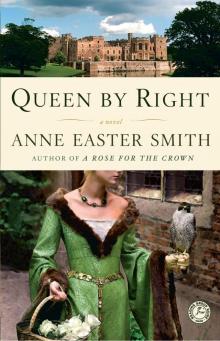 Queen By Right
Queen By Right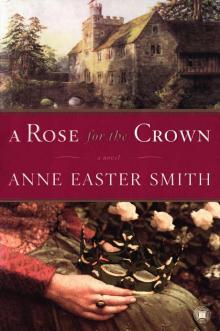 A Rose for the Crown: A Novel
A Rose for the Crown: A Novel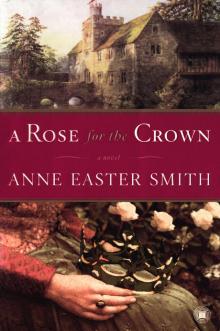 A Rose for the Crown
A Rose for the Crown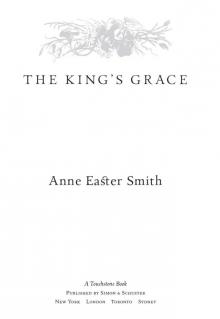 The King's Grace
The King's Grace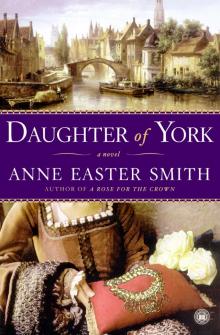 Daughter of York
Daughter of York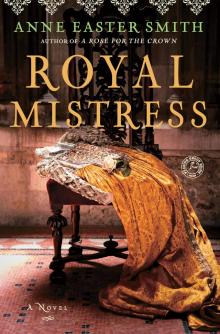 Royal Mistress
Royal Mistress